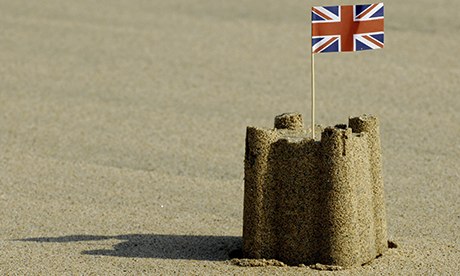Those who can afford mortgage payments but don't have large deposits can get on the property ladder with #helptobuy launching today
— George Osborne (@George_Osborne) October 8, 2013
The flagship announcement from Conservative Party conference was the bringing forward of stage two of the Help to Buy scheme. To encourage mortgage lending by the banks, the government will guarantee 15% of the loan value.
RBS, Lloyds and HSBC are among the banks that have signed up to the scheme and today announced 95% mortgages - something that had largely withered post-crash as banks (understandably) became more cautious in their lending.

Home ownership has been a central plank of the Conservative narrative for over 30 years now - but this government has been the first post-war which has overseen a decline in home ownership. Home ownership peaked at 72% of households, but it has now dropped to 65%. The Daily Telegraph described it as "a national crisis".
Leaving aside the Telegraph's attack of the vapours, I'd argue there's a lot wrong with Help to Buy - including:
It doesn't help those in the most housing need
The real national crisis is not the nature of housing occupancy, but the rising homelessness, chronic housing waiting lists, and the soaring cost of private rent - exacerbating the cost of living crisis. The number of households living in temporary accomodation has risen 10% in the last year. These households need social housing (preferably council housing).
It won't build the houses we need
While stage one of Help to Buy (began in April 2013) applied only for new build homes, stage two applies to existing housing stock. Last year, the number of homes built in the UK was the lowest on record since the 1920s. But the scale of house building required to meet housing need, cannot be driven by the mortgage market.
It will increase house prices - making home ownership even more unaffordable
House prices are rising due to constrained supply. Increasing the availability of credit to borrow to buy housing can only push up house prices (increased competition for the same number of units). This will make home ownership even more unaffordable. As wage increases remain stagnant, the average house
price has risen to 6.74 times the average wage. For comparison it was only 4.21 in 2000, but reached 7.23 in 2007 at the peak of the housing boom - and we know what happened then.
It helps private landlords more than aspiring homeowners
Help to Buy is available to buy-to-let landlords. Capital rich and in no housing need, it is hard to make a case for a government subsidy for buy-to-let - though of course the Tories did it in the 1980s too. Buy to let mortgages are already subsidised through the tax system as mortgage interest is tax deductible. Help to Buy is therefore a further taxpayer subsidy to the rich. The return of 95% mortgages still means an deposit of over £12,000 is required on the average house price - not inconsiderable (according to the MoneyMood survey, the average household is saving just £42 a month).
It will push up private rents
The cost of private rents have outstripped wage rises in recent years. If house prices are inflated and more homes become buy-to-let investments (see above two points), the most likely outcome is that rents will rise as well - increasing the risk of those renting falling into arrears or debt, while pushing them further away from the stated goal of home ownership.
It's a crap economic stimulus
We have argued that there is a strong case for public borrowing for growth, but what Osborne's Help to Buy scheme does is land the public with potential liabilities, with nothing to show for it. If these loans default, then either tax rises or public services are cut to ensure the banks don't take the hit.
It could cause another crash
While Ed Balls has been among those calling the recently more positive economic growth figures "the wrong sort of recovery" - something we have also alluded to, twice - Help to Buy could tip that 'wrong sort of recovery' into another crash. Increasing debt levels when wages are stagnant and the labour market far from stable (not to mention any risks from global instability), increases risk and the government could end up with considerable liabilities if defaults rise.
In short, Help to Buy does nothing to solve the UK crisis in housing affordability (of whatever tenure), may actually make it worse, and comes with not inconsiderable risks to the wider economy - and the Prime Economics website thinks the EU may even rule the scheme to be 'illegal state aid'.
This is a government with no housing policy, only a mortgage policy ... and a pretty crap one at that.
And just going to fuel another property bubble - we need more new build affordable houses. Not scheme after scheme.
ReplyDeletewhat house?
Help to buy is not available for buy to let landlords.
ReplyDelete